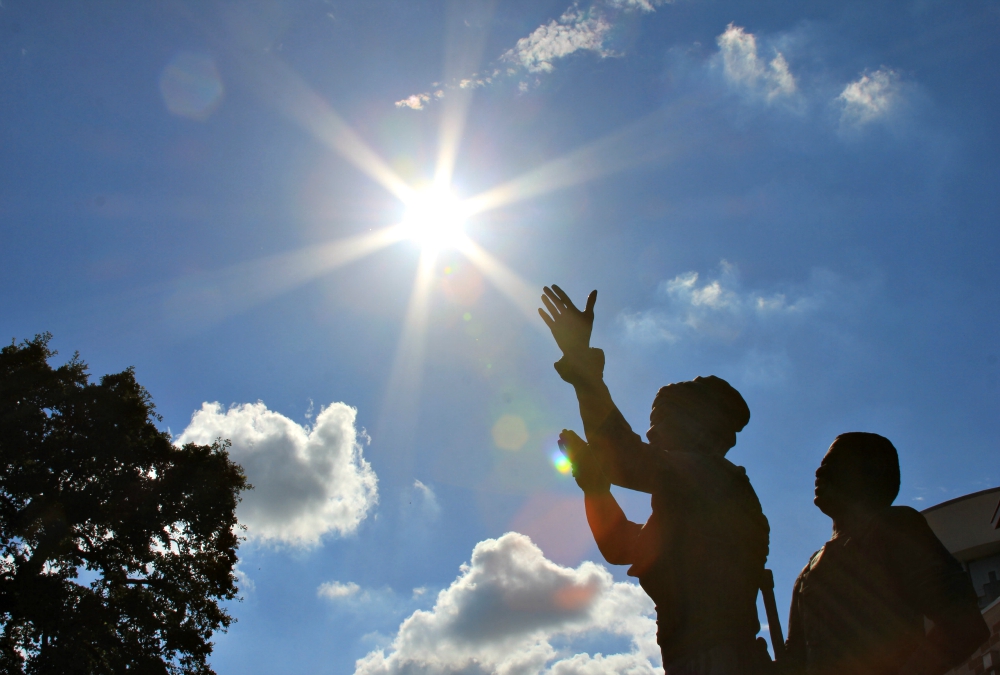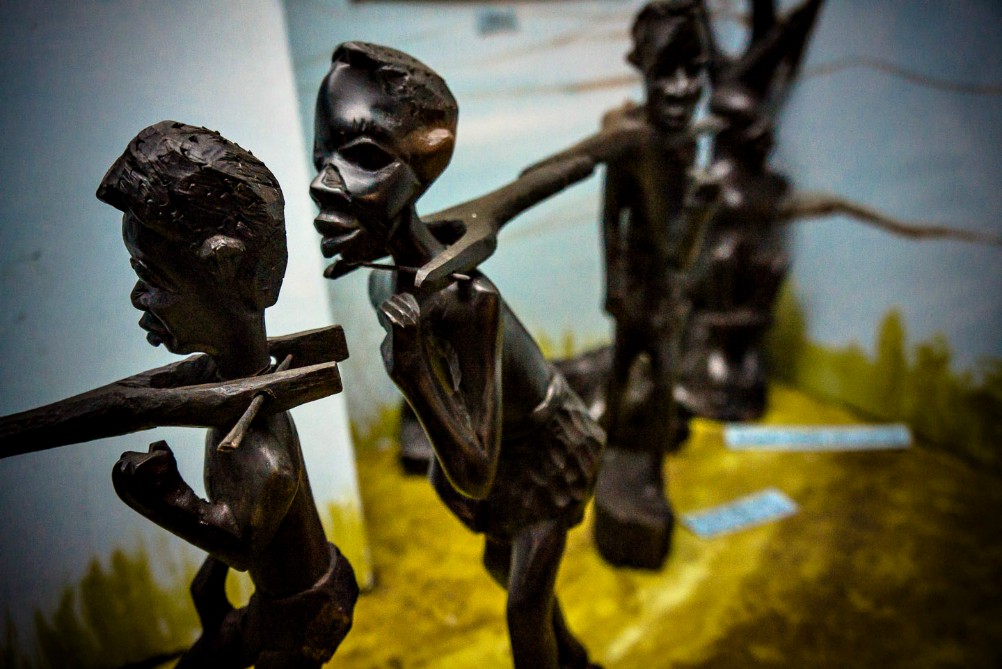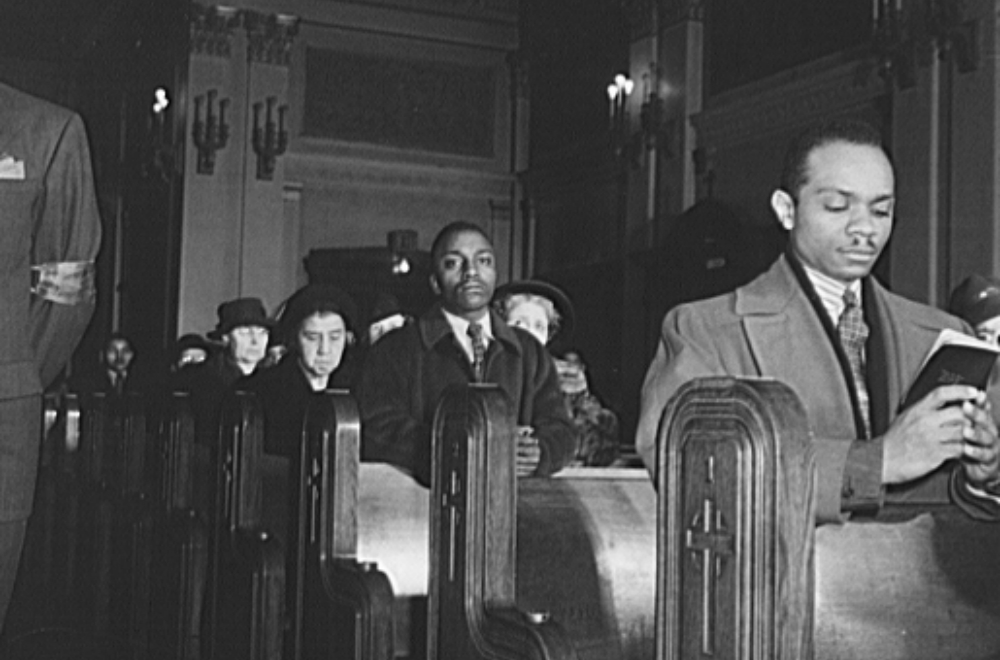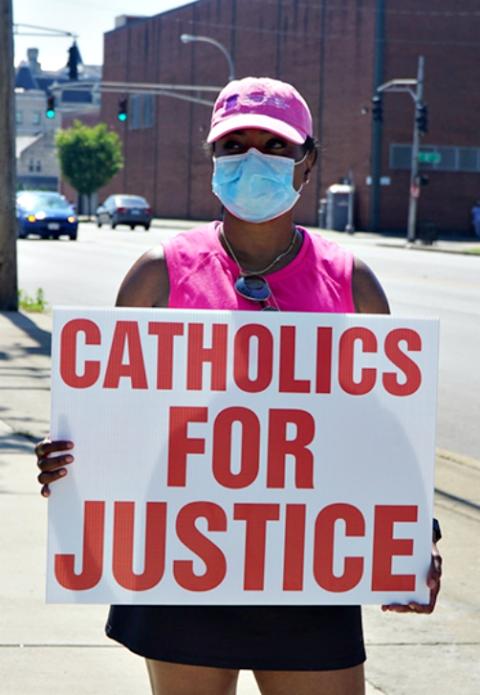
Statues are part of the Juneteenth Memorial Monument, which commemorates African Americans' emancipation from slavery, at the George Washington Carver Museum, Cultural and Genealogy Center in Austin, Texas. (Wikimedia Commons/Jennifer Rangubphai)
The ever-expanding protests over the epidemic of police violence and systemic racism in the United States, manifested most recently in the murders of George Floyd, Breonna Taylor and Ahmaud Arbery, have brought our society to another monumental crossroad.
At the intersection of these enduring crimes against humanity and protesters of varying hues and creeds screaming, "Enough is enough," is a global system of anti-Blackness and violence that has strangled Black communities in the United States and across the African Diaspora since the rise of the trans-Atlantic slave trade. That these murders and protests have erupted amid a global pandemic that is disproportionately killing Black and Brown people only underscores the unchecked ferocity of institutionalized systems of white supremacy in our society.
In recent days, Catholic statements condemning the sin of racism alongside some clergy and sisters at #BlackLivesMatter protests across the country and world offers hope to those who have long struggled against the plague of white supremacy within and outside church boundaries. This is especially true for many Black Catholics who initiated the fight against racism in the Catholic Church in the modern era and Black Catholic women and youth who have been shouting Black Lives Matter since the hashtag emerged from three Black women activists in 2013 following George Zimmerman's acquittal in the murder of Trayvon Martin.
That it has taken so long for the institutional church and many non-Black Catholics to embrace the rally cry of #BlackLivesMatter, however, cannot be ignored. It must be said, too, that the recent Catholic statements on racism and rising protests fall way short when it comes to acknowledging the church's role in the contemporary crisis and direct complicity in the sins of anti-Black racism, slavery and segregation in the modern era.

Carvings depict a caravan of people being taken into slavery at Lake Malawi Museum in Mangochi, Malawi. (Wikimedia Commons/Tim Cowley)
While Catholic social teaching affirms "the right to life and dignity" of every person, the fact remains that the church egregiously violated these teachings through its participation in the trans-Atlantic slave trade and imperial practices of African slavery and segregation in the Americas, Europe and Africa.
In the 15th century, the Catholic Church became the first global institution to declare that Black lives did not matter. In a series of papal bulls beginning with Pope Nicholas V's Dum Diversas (1452) and including Pope Alexander VI's Inter Caetera (1493), the church not only authorized the perpetual enslavement of Africans and the seizure of "non-Christian" lands, but morally sanctioned the development of the trans-Atlantic slave trade. This trade forcibly transported at least 12.5 million enslaved African men, women and children to the Americas and Europe to enrich European and often Catholic coffers. It also caused the deaths of tens of millions of Africans and Native Americans over nearly four centuries.
In the land area that became the United States, the Catholic Church introduced African slavery in the 16th century long before 1619. In fact, at various moments in American history from the colonial era to the U.S. Civil War, the church was the largest corporate slaveholder in Florida, Louisiana, Maryland, Kentucky and Missouri. We must also never forget Roger B. Taney, the nation's first Catholic Supreme Court Justice and a descendant of prominent Catholic slavers from Maryland, infamously declared that Black people "had no rights which the white man was bound to respect," while denying the freedom petitions of Dred and Harriet Scott and their two daughters in 1857.
Advertisement
In Latin America and the Caribbean, Catholics, including religious orders of men and women, were also the largest owners of enslaved people during the colonial era. In Brazil, which received the largest number of enslaved Africans imported to the Americas, the Jesuits were at the center of the brutal sugar economy. Like their counterparts in the United States, Black Brazilians today, who are mostly Catholic, are fighting systemic racism and one of the highest rates of police murder against Black and Brown people in the Americas.
Following the abolition of slavery, the Catholic Church stood as the largest Christian practitioner of segregation. In the United States, where the history of many Black Catholics predates that of white and ethnic white Catholics by over three centuries, the vast majority of Catholic institutions and religious orders of men and women systematically excluded African-descended people, especially U.S.-born Blacks, from admission solely on the basis of race well into the 20th century.
The historical record is inundated with gut-wrenching examples of Black Catholic faithfulness in the face of unholy discrimination and segregation in white Catholic parishes, schools, hospitals, convents, seminaries and neighborhoods. Yet, this history is rarely incorporated into dominant narratives of the American Catholic experience.

Sunday Mass at Corpus Christi Church, a predominantly black parish, in Chicago in 1942 (Library of Congress)
The systematic denial and erasure of Black Catholic history denies the fundamental truth that Black history is Catholic history. It also a part of the system of white supremacy that continues to inflict harm on the descendants of the enslaved people who literally built this country and the American church and those who continue to benefit from the brutal history of colonialism, slavery and segregation.
In New Year 2020, I outlined a plan of action for Catholic reparation for slavery and segregation in Catholic News Service. This included:
- Making formal apologies for the church's own histories of slavery and segregation;
- Stopping the closings of active African American parishes;
- Reinvesting in and expanding the Black Catholic educational system;
- Requiring the teaching of Black and Brown Catholic history in every Catholic school and seminary;
- Endowing scholarships, fellowships and professorships for Black and Brown scholars at Catholic colleges and universities;
- Broadening formal church leadership to include anti-racist women and members of the laity.
I also called upon Catholics to take leading roles in campaigns working to protect Black lives, eliminate racism in the health care system, end mass incarceration and bail, and secure police reform and accountability.

Kenya Turner, a member of St. Martin de Porres Church in Louisville, Kentucky, joins the "Black Catholics Unite: Stand For Justice March" on June 6. (CNS/Courtesy of The Record)
In the wake of uprisings sweeping the world, the obscenely high unemployment rates in the Black community as a result of the pandemic, and the growing use of militarized police forces against protesters, additional actions are warranted. I now wonder if Catholic reparation must also include creating institutions to help establish more formal connections and foster long-term engagement between African American Catholics and African Catholics in Africa. Over the past few years, significant numbers of African Americans and other members of the African Diaspora living in the West have begun to repatriate to Africa in response to the rise of white supremacist and state violence threatening Black communities.
The earliest documented roots of the Catholic Church are in Africa. Considering the fact that the church is also currently experiencing its greatest rates of growth on the continent, it would be a substantial development for major U.S. Catholic universities to follow the lead of Webster University in Missouri and begin establishing African American and African-led campuses in Catholic Africa with exchange, enrichment and study abroad programs at every level from K-12 to the university and the adult laity.
While I do not yet foresee a mass Black exodus from the United States, assisting in efforts to reconnect Black people to the land of their ancestors and growth in Africa is essential. Moreover, if there ever came a time when Black Americans did need to flee for their safety, the church could play a leading role.
The denial of the dignity and sanctity of Black life is a part of the DNA of this country. It is also a foundational sin of the American Catholic Church. Black Catholic history reveals that the church has never been an innocent bystander in the history of white supremacy. If there will ever be a chance for true peace and reconciliation, the Catholic Church must finally declare with all of its might and resources that Black lives do matter. The goal for Black people has never been charity; it is full justice, human rights, freedom and the complete dismantling of white supremacy, beginning with the church.
[Shannen Dee Williams is the Albert Lepage Assistant Professor of History at Villanova University. She is completing her first book, Subversive Habits: Black Catholic Nuns in the Long African American Freedom Struggle with Duke University Press. In 2018, she received the inaugural Sr. Christine Schenk Award for Young Catholic Leadership from FutureChurch for using history to foster racial justice and reconciliation in religious congregations of women.]








